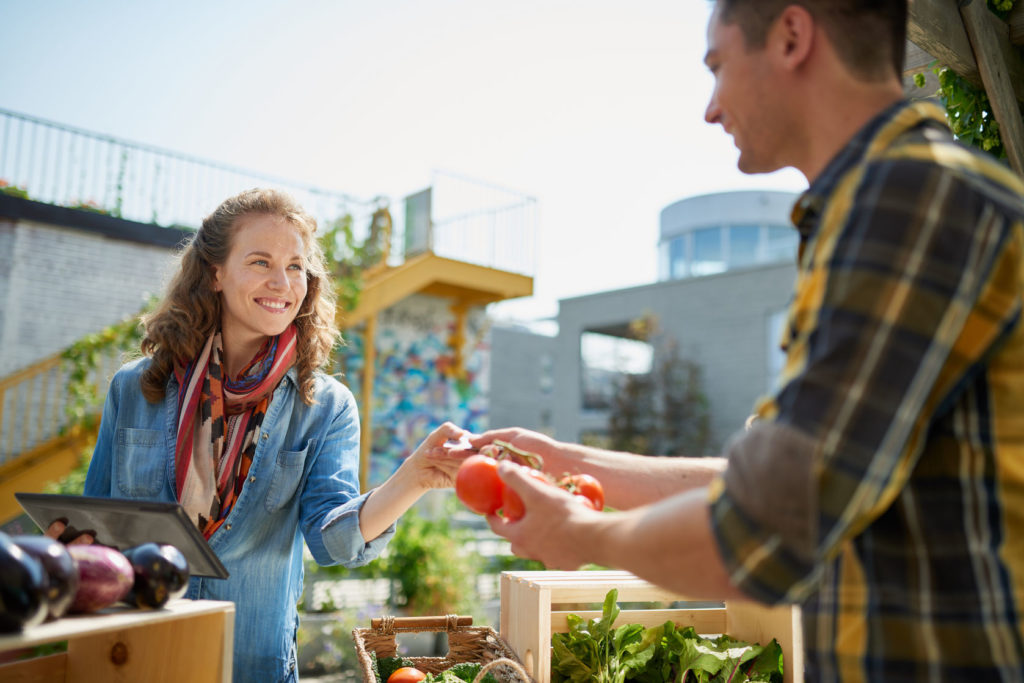We’ve been living on credit since Wednesday 2 August. According to calculations by the Global Footprint Network NGO, this was “Earth Overshoot Day” for 2017: the date by which mankind had consumed as many natural resources as the planet can renew in an entire year.
The French people are increasingly aware of the ecological emergency facing us, and are gradually learning more about responsible behaviour. But assume the whole sustainable development effort themselves? No chance.
The Greenflex sustainable consumption barometer
Each year, the consultancy company Greenflex, which proposes sustainable solutions for businesses, publishes its barometer survey “We’re all in it together! The French and responsible consumption” . Let’s take a moment to look at the 2017 version, carried out with a representative sample of the French population, involving 3,800 people aged from 15 to 74 years old.
“At a time when the French are beginning to look to the future once again and display (slightly) greater openness to others, responsible consumption continues to make headway but takes second place to the simple desire to consume”, states the introduction to the 2017 Barometer. Despite this, the French people are not willing to shoulder the effort required for “sustainable development” alone. They clearly expect each stakeholder in society (the state, companies and brands, associations and distributors) to play their part too. In this new ecosystem, their expectations vis-à-vis these stakeholders are more than ever proportional to their mistrust of them, and this is particularly the case concerning the companies and brands”.
Health: a key factor
Among the major trends for 2017, Camille Lebret, CSR Project Leader at Altavia, reminds us that:
– Health is the key factor in responsible consumption: 45% of consumers would purchase environmentally friendly products as a priority because they have less of a negative impact on health;
– Although the French are increasingly vigilant concerning the quality of the products they buy, though they may now be consuming differently they nevertheless continue consuming;
– As 53% of the French population see it, consuming responsibly means consuming differently, including: products which are covered by quality labels, which are local, organic and derived from fair trade, etc.
– Consumers have less confidence in the major companies: in 2017, only 27% the French population stated that they trust them;
– Distributors (retail) are seen as a credible alternative to the specialised stores and major brands;
The health issue plays a central role. The barometer is presented as “introducing underlying attitudes to responsible consumption. In a world which is perceived as harmful, people consider it necessary to preserve their health, particularly by choosing sustainable products. A clear sign of this trend, is that the very definition of a quality product now encapsulates a desire for health”.
A willingness to act… but not alone
To the question “In your opinion, how important are the following stakeholders when it comes to taking concrete action to promote sustainable development?”, those interviewed rated companies and brands in first place; in second place came the state; in third place individuals themselves; and finally the distributors. Considered by the French population as the fourth most important stakeholder when it comes to bringing about change (compared to 6th in 2014 and 5th in 2016), the legitimacy accorded to the distributors where sustainable development is concerned is increasing, and rivalling that of the major brands.
Opportunities for the retail sector
“Generally, the barometer survey highlights fresh dynamism”, states Camille Lebret. “With their answers, the French people are showing that they are more optimistic and have greater confidence in the future. They are once again looking to the future, which is good news for the store chains, the brands and the mass retail sector”.
Some store chains have clearly understood that it was necessary to respond and to expand the range of responsible products. “An Opinion Way survey has shown that 89% of the French population feel that a company can achieve high performance while at the same time having a positive social and environmental impact” adds Camille Lebret.
Franprix, the local urban store chain belonging to the Casino group, recently launched a new concept, “Franprix Noé”. The shop, which is located in rue Mouffetard, in Paris, is devoted to responsible consumption. Here, consumers will find organic, fair-trade and locally produced products selected for their quality and flavour. On the store window, it is stated that: “Here, every customer can be sure that the products they buy contribute to the trend towards more responsible consumption. We give pride of place to organic and fair-trade products, but more too, as we are also open to non-labelled products which deserve our trust and confidence for their quality and origin. Above all, we promote flavour, health and happy living”.
For its part, Carrefour Bio is launching in Spain, in Madrid. Situated in Calle Velarde 1, the store proposes more than 1,800 organic products in a 140 m² sales area.
Today, every store chain in the mass retail sector proposes an organic section for its customers, chiefly selling food products. According to the Agence Française pour le Développement et la Promotion de l’Agriculture Biologique (French Agency for the Development and Promotion of Organic Farming), “the market share of the supermarkets and hypermarkets is approximately 45%, ahead of specialised organic distributors (37%), and direct sales by producers to consumers (13%) and craftsmen or retailers (5%)”.

